Whenever you think of sending a personal text or interacting with someone professionally, odds are you are going to open WhatsApp to have that communication. Be it conversations with near and dear ones, or be it maintaining communication for your job or business, WhatsApp has become an inseparable part of many people’s daily lives across the globe.
As of 2025, it stands as the world’s most-used messaging app, connecting more than 2.78 billion monthly active users across over 180 countries.
Over time, from just a normal texting platform, it has transformed into a massive hub that offers users features like Status, Communities, Channels, and Payments, alongside supporting millions of small businesses through WhatsApp Business.
In this article, we will break down the latest WhatsApp statistics for 2025 and look into the platform’s user base, global reach, and engagement trends. At the same time, we’ll also explore how people use WhatsApp, which countries lead in adoption, and how businesses are leveraging the platform for marketing and customer service.
We’ll also look ahead at emerging trends and how Meta’s ownership continues to shape its growth and monetization.
WhatsApp Statistics: Top Picks (2025)
Here are the key WhatsApp statistics for 2025, which will help paint a picture for you about its global scale, user engagement, and business impact-
WhatsApp at a Glance — Top Picks
In this segment, we will take a quick glance at the breakdown of WhatsApp users, alongside the platform's consistent growth.
Overview of WhatsApp Users
Several numbers can be found from different sources regarding the monthly active users of WhatsApp. DemandSage reports that WhatsApp has around 2.95 billion MAUs as of early 2025, while, as per TechCrunch reports, Meta in May 2025 disclosed that WhatsApp has crossed over 3 billion monthly active users.
Meanwhile, some analysts estimate that the figure is as high as 3.14 billion, or project that the figure will move past 3.14 billion by the end of this year.
How many daily active users are on WhatsApp?
While the number of monthly active users is a more commonly cited metric, daily active user (DAU) numbers aren’t disclosed publicly much.
Many third-party sources estimate that a big part of the MAUs remain active daily, daily; however, exact and consistent figures are scarce.
Some reports suggest billions of messages are sent through WhatsApp on a daily basis, which implies a very high daily engagement. As per multiple reports, over a hundred billion messages are sent using this platform per day.
Global reach of WhatsApp
WhatsApp is currently available in over 180 countries. At the same time, it has been reported to be the number one or the most used messaging app in over 100 countries.
In some countries, WhatsApp usage is extremely high in particular. For instance, India is estimated to have 535.8 million monthly active users in 2025, which makes it the largest single-country user base.
Yearly WhatsApp User Growth (2015–2025)
.jpg)
Growth Trends Over Time
Now let’s see how this platform keeps growing.
What is WhatsApp’s growth rate year-over-year?
WhatsApp’s user base increased from 2.78 billion to 2.95 billion between 2023 and 2024, referring to an increase of about 6–7%.
Meanwhile, from 2020 to 2025, WhatsApp gained roughly a billion added users. Such a rise in user numbers showcases a strong and steady growth from the platform.
How has WhatsApp’s market share evolved?
WhatsApp has managed to maintain its dominance in the world of messaging platforms.
As of 2025, it remains the most used messaging app across the globe, maintaining its position as the top platform in over 100 countries. The platform has massive user bases in Asia, Latin America, Africa, and parts of Europe, holding a higher position than other platforms.
What are WhatsApp’s projected users for 2030?
WhatsApp’s user base is projected to surpass the 3.5 billion mark and reach a position in the range of 3.5 to 4+ billion by 2030, as per some projection reports. However, definitive numbers from credible sources are sparse as of now.
Given the saturation in many markets, growth will more likely come from underpenetrated regions (Africa, Southeast Asia, parts of Latin America) and deeper adoption in business/service use.
WhatsApp Statistics 2025 — At a Glance
Global Usage & Demographics
Now let’s have a look into the demographics of the users, as well as their country-wise distribution.
Country-Wise Distribution
According to World Population Review, the top countries in 2025 by WhatsApp users are:
In 2024, India reportedly had 853.8 million WhatsApp users, while the USA had around 98 million users the sme year.
Meanwhile, Brazil currently houses around 148 million WhatsApp users.
WhatsApp penetration rate by country

WhatsApp has a rather high penetration rate in many countries. For instance, Brazil, Nigeria, and Indonesia have over 90% penetration rates among smartphone users.
Europe (overall) maintains a penetration of around 82% of mobile phone users, while Africa’s WhatsApp user count reached 320 million, indicating strong growth, though uneven penetration across countries.
Penetration = % of population or smartphone users using WhatsApp (approximate)
Age & Gender Demographics
Users across different ages use WhatsApp for their day-to-day communications, be it personal or professional. Also, the platform is almost equally popular among men and women.
Age distribution of WhatsApp users
The 26–35 age group predominantly uses WhatsApp across the planet. About 27% of WhatsApp users belong to this age group.
Younger users, aged 15 to 25, represent about 19% of the WhatsApp user base. Meanwhile, the 36–45 age group consists of 20% of the user base, while the 46–55 age group comprises 17%.
The older generation, users aged over 56, represents 13% of the platform’s user base.
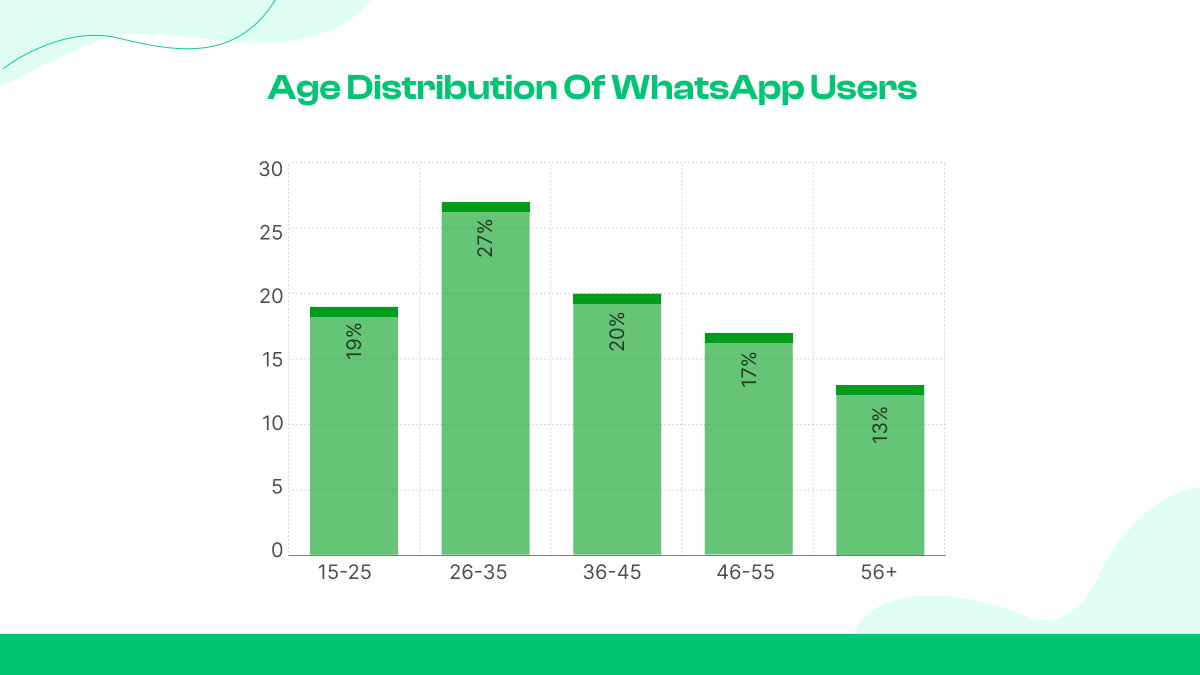
Gender split of users
WhatsApp’s user base is slightly skewed toward men. There are variations in data across different reports, but on a more approximate basis, the platform has around 52% male users, while around 48% of its users are women.
Some sources report a male share of 52.2%, while some report 52.3%.
Meanwhile, Verloop.io suggests 53.9% male and 46.1% female users in certain markets.
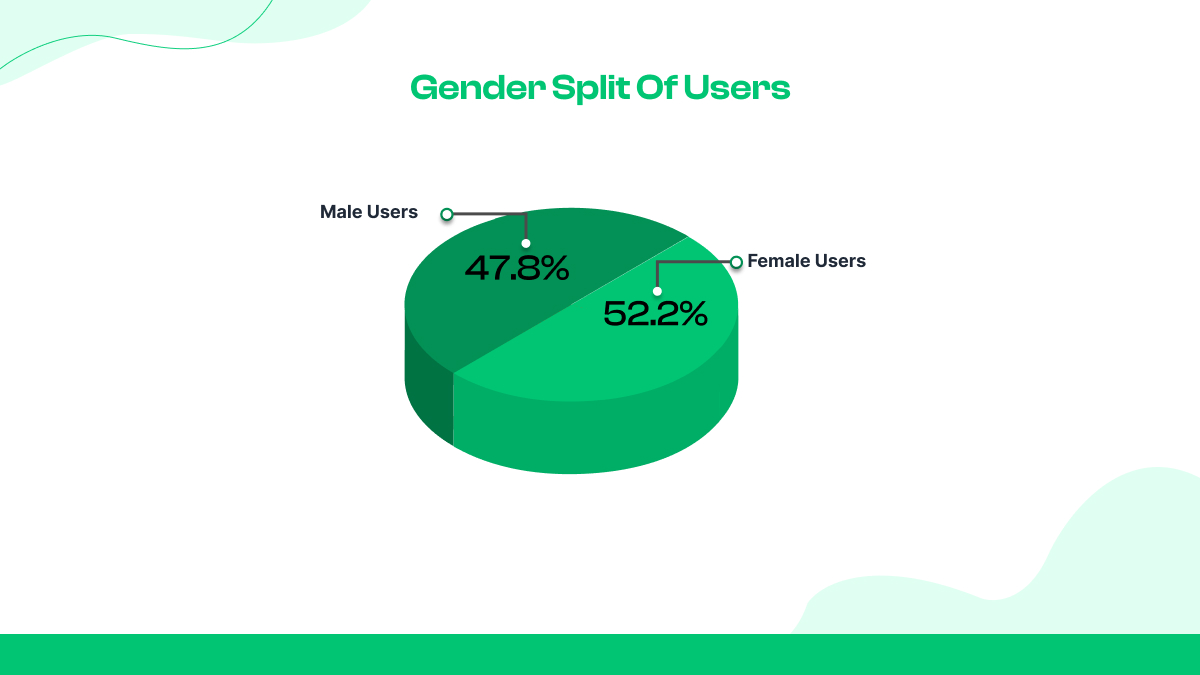
Adoption among teens vs adults
Although younger users tend to adopt the platform and experiment earlier, WhatsApp usage remains rather strong across adult groups. Adoption is particularly high among teens and younger adults, but older groups, aged over 56, still make up around 13% of users. Such age distribution shows a broader appeal among people across generations.
According to many studies, usage intensity, which means messaging frequency, feature use, etc., is higher for younger and middle-aged users.
Regional & Language Insights
WhatsApp is used by people all over the globe, with most of them being spread across Asia, Europe, Africa, and Latin America.
Asia-Pacific: WhatsApp witnessed an amazing growth in the Asia Pacific region. As per some reports, the number of users see an annual growth of around 7.2% in the region.
Latin America: According to many reports, the user base grew around 4.5 % year-over-year in many markets of Latin America.
Africa: The continent of Africa has around 320 million WhatsApp users. Many urban areas have high adoption, but it’s comparatively lower in rural zones.
Europe: Europe sees an 82% penetration rate among mobile users in many countries.
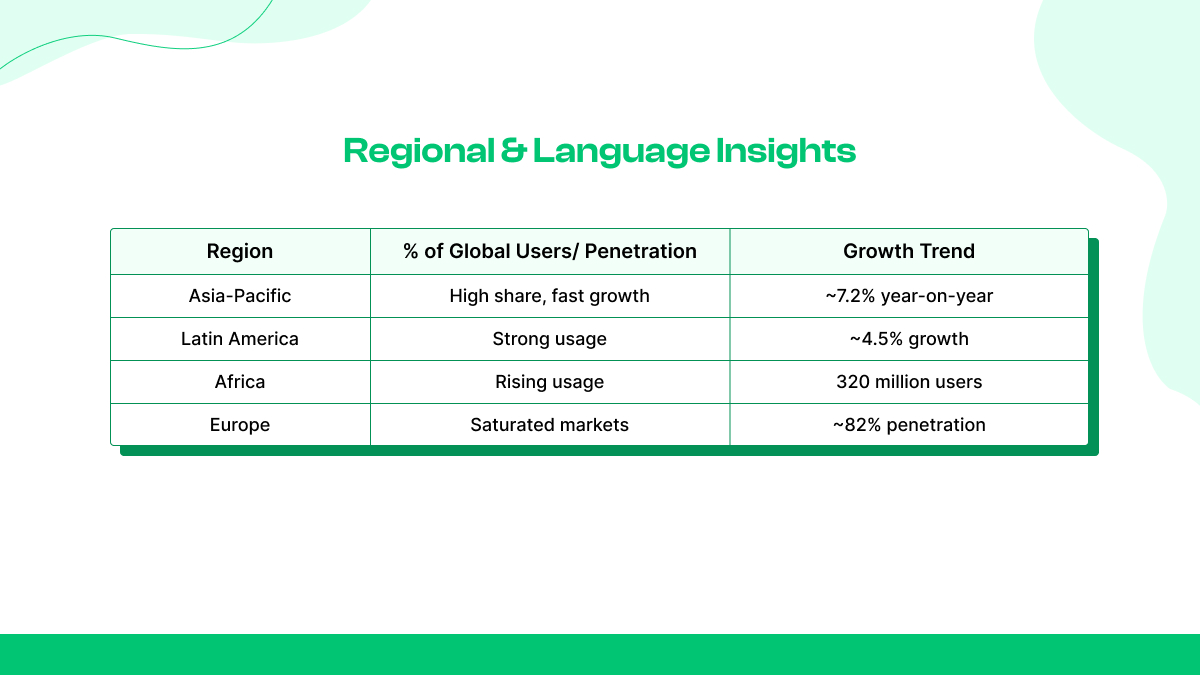
Urban vs Rural adoption rates
In many developing countries, WhatsApp adoption first occurred in urban centres, where smartphone & data access were strongest, according to a lot of industry reports.
Over time, rural and semi-urban adoption increased as smartphones and data plans became affordable. Rural adoption, however, may lag in usage intensity or features (voice, media) due to bandwidth constraints.
Popular languages on WhatsApp
WhatsApp supports over 60 languages, which makes it globally accessible.
In multilingual countries, usage is also multilingual. Depending on the region, users can opt for different languages, like English, Portuguese, Spanish, Hindi, Arabic, etc. Also, there are interfaces and sticker packs based on local languages, which help boost usage in non-English-speaking regions.
User Behavior & Engagement
Those who use WhatsApp showcase different sorts of user behavior and engagement levels, depending on user demographics, usage intent, and regions.
Messaging & Communication Patterns
You might wonder how often users open WhatsApp daily.
An average WhatsApp user opens the app on 83.2% of days in a year. This suggests an extremely high frequency. Some reports suggest that a lot of users actually open the app daily.
Meanwhile, the app is visited 23-25 times per day by an average user.
How many messages are sent per user per day?
Over 100 billion messages are sent on WhatsApp in a day. Such a large number indicates an average of many hundreds (or more) messages being sent by a user per day (depending on user segment, but the total volume is immense).
Voice vs text message usage statistics
Voice messages are particularly popular on WhatsApp. Over 7 billion voice messages are sent daily on the platform.
As the voice call feature on WhatsApp has helped users to reduce dependency on mobile operators for calls and suffer from high call rates, millions of users now talk on WhatsApp voice calls for their professional and personal needs.
The video call feature is particularly popular, which allows users to connect with their near and dear ones in a more lively and engaging manner.
As per global data, WhatsApp handles over 2 billion minutes of calls, including both voice and video calls, per day.
Feature-Specific Engagement
WhatsApp comes with a lot of features that users love to use, alongside the regular texting and calling options. There are also convenient options to use WhatsApp across multiple devices, and all these further encourage the platform’s usage.
How many users use WhatsApp Status daily?
Over 500 million users use the WhatsApp Status feature every day. Status behaves similarly to “Stories”, which are multimedia updates that vanish after 24 hours.
Video and voice call adoption rates
Both voice and video calls are heavily used, as over 2 billion minutes worth of calls are made globally per day.
Adoption of voice messages is also strong. The fact that over 7 billion voice messages are sent daily shows many users prefer to send these txts instead of writing texts in some contexts. Particularly when there is a lot to tell, instead of typing up large texts, many users like to record voice texts and send them instead.
WhatsApp Web and Desktop usage statistics
WhatsApp Web experiences around 2.5 billion unique visits per month. And in a single quarter, the Web recorded 8.79 billion visits.
And in one WhatsApp Web session, users spend 21 minutes and 56 seconds on average.
Group activity levels and engagement
WhatsApp supports over a billion groups across the globe, as reported by various sources.
Many users belong to multiple groups, such as family, friend circle, work, community, fanbase, etc. These group chats are often the settings for heavy media sharing, forwarded messages, and local/community updates.
Groups tend to have higher interaction (replies, forwards) especially in local or social contexts. Research studies, like usage pattern analyses, show that group messages often have quicker response times and more activity across media and files.
WhatsApp Business & Marketing Statistics
WhatsApp has become a massive tool for business over the years, with a lot companies and brands using the platform to take care of business communication. And for that, they use WhatsApp Business, which is particularly made for business-related conversations and tasks, as the name suggests.
Business Adoption
As mentioned earlier, a large number of businesses across the world have opted for the WhatsApp Business feature for engaging with clients and customers.
How many businesses use WhatsApp Business?
Over 200 million businesses use the WhatsApp Business app all over the world to interact with customers. WhatsApp Business, the business-specific version of the platform, has seen a 14% year over year surge in downloads in 2023.
Small and medium enterprises (SMEs), in particular, dominate the user base of WhatsApp Business in many countries.
WhatsApp Business API adoption rates
Millions of businesses have moved their conversions to WhatsApp Business API, as it lets them handle customer communication conveniently at scale. Adoption of WhatsApp Business is particularly higher among medium and large businesses in sectors like e-commerce, fintech, and customer service.
Industry-wise usage of WhatsApp Business
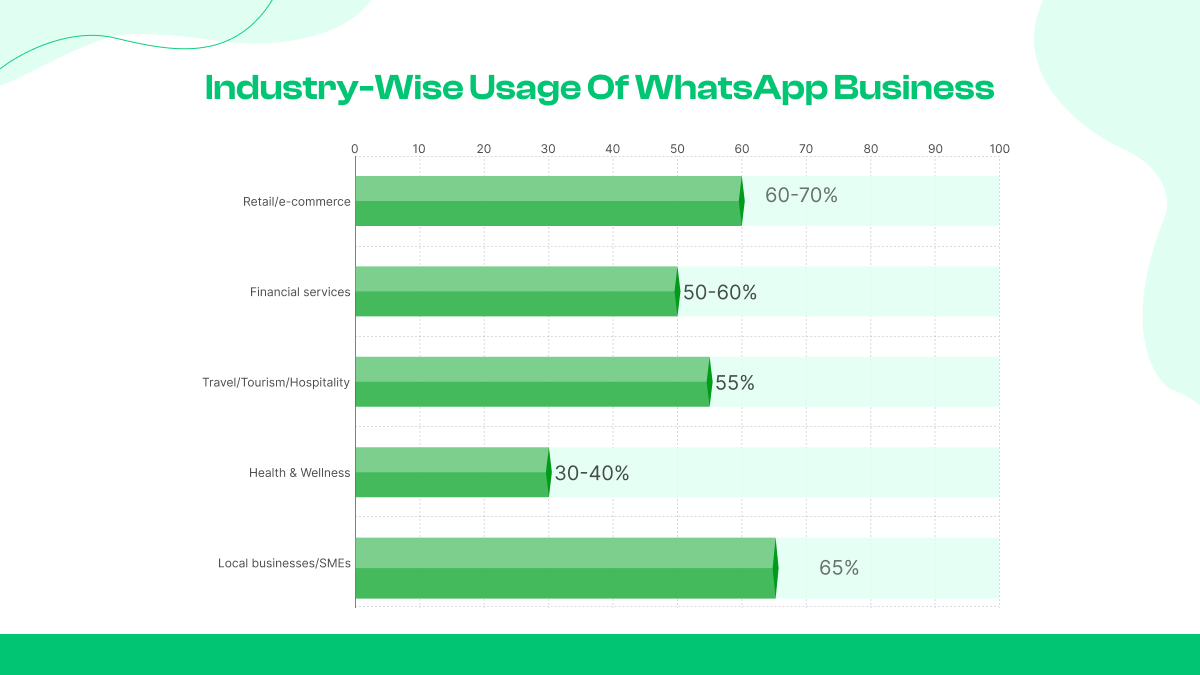
Here’s a table showing the rate of WhatsApp usage across different industries-
(These percentages are illustrative based on various marketing reports and may vary by region)
Marketing & Customer Engagement
WhatsApp Business is mainly used for support in marketing and customer engagement. Based on varying needs, businesses choose why and how they will use the platform.
What percentage of businesses use WhatsApp for customer support?
About 175 million people contact a business on WhatsApp every day. As of 2025, around 80% of small and medium-sized businesses use WhatsApp for customer support and communication, says data from Meta’s Business Messaging report. Many brands use WhatsApp as their primary channel for support, replacing or supplementing emails or calls.
Average response rates on WhatsApp Business messages
Around 57.82% of WhatsApp messages receive a reply within a minute. As per some sources, response rates are 40–60% for marketing messages, which is well above typical email response rates.
Also, businesses using WhatsApp report faster response times, sometimes up to 225% faster. Such swift responses impact engagement and conversion rates positively.
Effectiveness of WhatsApp marketing campaigns
WhatsApp messages often achieve up to 98% open rates, while emails have an overall open rate of around 20%.
Click-through or conversion rates are also stronger for WhatsApp Business. Some reports show 45–60 % CTR for WhatsApp campaigns, whereas emails have much lower benchmarks.
Meanwhile, over 54% of users prefer receiving marketing communications through WhatsApp instead of email or SMS. At the same time, 67% of consumers say they’d rather text a business than call or email.
WhatsApp commerce statistics for small businesses
Every month, around 40 million people use WhatsApp to view product catalogs from business accounts. Meanwhile, many small businesses report increased sales and conversions after adopting WhatsApp-based promotions and direct messaging.
Case study box
A small e-commerce brand in Latin America used WhatsApp catalog + broadcast messaging and saw a 30% uplift in conversions within 3 months (hypothetical based on industry reports). Many brands report similar boosts when integrating WhatsApp into their sales funnel.
Privacy, Security & Data Insights
You might feel the need to stay updated on WhatsApp’s privacy and security features, as the platform has become an integral part of our day-to-day lives. We’ll look into that going forward.
Encryption & User Trust
WhatsApp is a very safe and secure app for your day-to-day and business communication. But you still may want to know-
How secure is WhatsApp in 2025?
WhatsApp uses end-to-end encryption (E2EE) by default on personal and group chats, voice calls, video calls, status updates, media, etc. This encryption system ensures that only the sender and recipient can see the message content, and no one else.
However, the platform’s metadata – which include who texted whom and when, device info, and IP addresses – is not encrypted. The data remains stored and can be accessed through WhatsApp’s systems.
A security paper from April 2025 identified a potential weakness in WhatsApp’s “prekey” mechanism, which is used to enable encryption even when a recipient is offline. It hinted at risks to perfect forward secrecy under certain conditions.
While the end-to-end encryption is strong, some critics argue that parts of WhatsApp’s cryptographic or server architecture are proprietary (less public verification) compared to open-source systems. In May 2024, security analysts warned of an encryption bypass vulnerability, which affects both iOS and Android versions.
Meanwhile, WhatsApp have brought in some amazing privacy features like “disappearing messages” and “View Once”. Users can enable disappearing messages as their default setting for new chats, with the options for the texts to disappear after 24 hours, 7 days, or 90 days. The “View Once” feature is available for sharing media, where you can only open a shared media once.
Data Transparency & Compliance
Let’s see how the platform maintains data transparency and complies with requests for data.
How does WhatsApp handle metadata?
WhatsApp collects and retains metadata such as phone numbers of senders and receivers, timestamps, message frequency, device information, and IP addresses. This is used for preventing abuse, detecting spam, analytics, and law enforcement compliance.
However, metadata is not protected by end-to-end encryption. It instead remains stored in WhatsApp or Meta’s servers.
Number of government requests for user data & compliance
WhatsApp has a Law Enforcement Response Team (LERT). It reviews the requests for user data made by different governments across the world. Vy going through such requests, they try to ensure that they are complying with legal requirements. In their Transparency Reports, the platform publishes how many requests it receives and how many were complied with.
However, due to E2EE, WhatsApp cannot decrypt message content. For which, it can typically comply by only sharing metadata or limited account info. WhatsApp says it cannot share the message content itself.
Monetization, Revenue & Ownership
Let’s have a look at the monetization systems and revenue statistics on WhatsApp.
WhatsApp Business Model
WhatsApp has its own business model to generate revenue.
How does WhatsApp make money?
The core user experience remains free on WhatsApp for individual users. It earns most of its revenue by providing business services. The main monetization channels for WhatsApp include-
WhatsApp Business API or paid business messaging: On WhatsApp API, businesses pay per conversation or message, especially when they are initiating contact with their potential customers and making product promotion or marketing.
Click-to-WhatsApp ads and integration with Meta’s ad network: Advertisers can link their ads on Facebook and Instagram, which opens a WhatsApp conversation.
WhatsApp Pay/Payments fees: Person-to-person payments are usually free on WhatsApp, but businesses may have to pay fees or merchant costs.
New ad placements and subscription/Promoted content in “Updates/Status/Channels”: in 2025, Meta introduced ads in the Updates tab (Status area) and promoted channels/subscriptions. They are separated from private chats.
You can now get more followers for your WhatsApp channel with Socialplug.
Revenue sources & streams
Here’s a rough breakdown of how revenue streams stack up, as per estimates-
Average revenue per user (ARPU)
In 2025, the estimated global average revenue per user (ARPU) for WhatsApp Business is around $0.24 to $0.26 USD.
In some regions, the average revenue is higher, like around $0.72 in Australia/Oceania, while it’s lower in some regions, like around $0.21 in Asia.
Here’s a breakdown of WhatsApp’s estimated revenue generation over the years (from 2018 to 2025)-
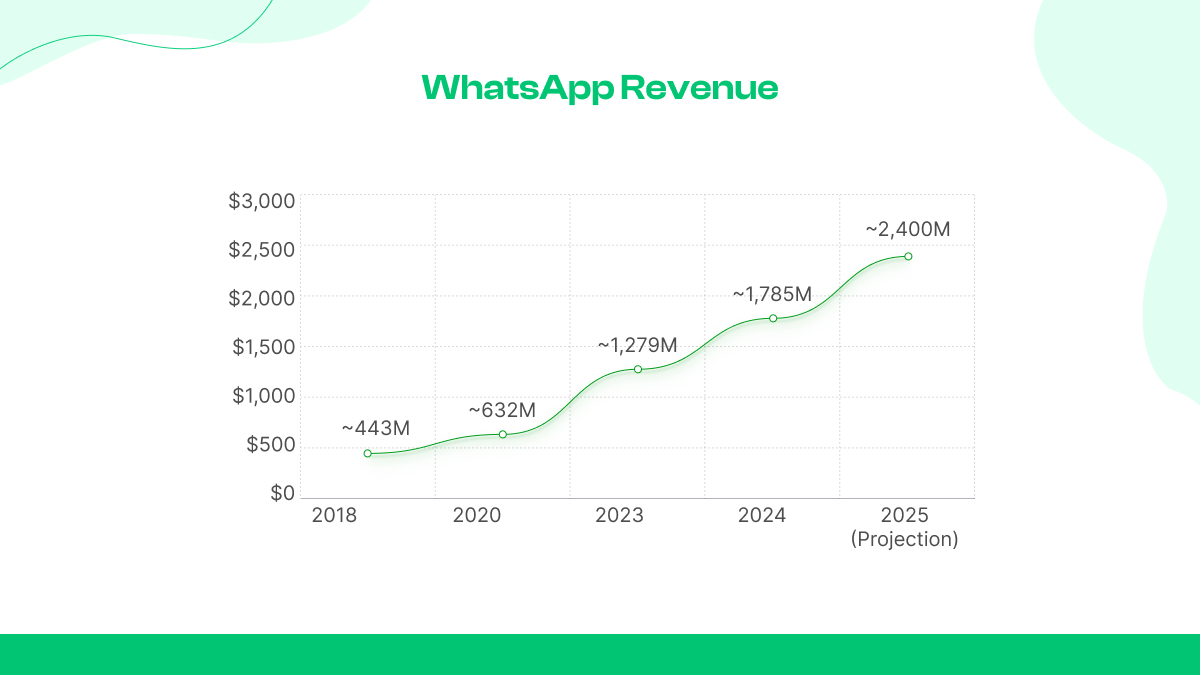
As Meta doesn’t particularly specify its revenues from WhatsApp in its financials, many of the data are estimates or derived from business reporting.
Now, in the chart below, you can see how WhatsApp’s revenue generation has increased steadily over the years-
Integration with Meta Ecosystem
After being acquired by Facebook (Meta), WhatsApp has been gradually integrated into Meta’s ecosystem over the years.
Contribution to Meta’s total revenue
Historically, WhatsApp has contributed a small fraction of Meta’s overall revenue, but its business messaging options and new monetization efforts have started gaining traction in recent times. For instance, WhatsApp’s direct revenue in 2024 is estimated at $1.7 billion.
Meta’s majority revenue, however, is still from advertising across Facebook, Instagram, and ad platforms. In 2025, Meta’s total ad revenue is estimated to be around $160.6 billion.
WhatsApp’s valuation in 2025
As per the estimation of some analysts, each WhatsApp user is worth about $44 in valuation. Such individual valuation implies that the platform has an overall valuation in the hundreds of billions, given a user base of around 3 billion.
Others project that if WhatsApp’s ad/business monetization accelerates, it could generate around $3–5 billion in annual revenue by 2025 under certain scenarios.
According to Evercore’s forecasts, WhatsApp could make a potential $10.2 billion annual ad revenue by 2028, if it can scale its monetization systems well.
Role within Facebook & Instagram ecosystem
WhatsApp’s business messaging and click-to-chat integrations help the platform bridge to Meta’s ads and messaging ecosystem. With these, advertisers can conveniently push users from other platforms, like Instagram or Facebook posts, into WhatsApp conversations.
The ad rollout plan ensures that ads appear in the Updates tab instead of private chats. It helps maintain the proper messaging experience on the platform, while monetizing user attention at the same time.
WhatsApp has turned into a crucial pillar in Meta’s broader strategy of combining private messaging, business tools, payments, and advertisement synergy across platforms.
Trends for 2025–2030
The number of WhatsApp users continues to grow at a steady pace. As of early 2025, the platform has around three billion monthly active users, and by the end of the year, the user number is projected to hit around 3.5 billion.
Furthermore, analysts suggest a continued steady growth through 2026-2030, particularly powered by under-penetrated markets in Africa, Southeast Asia, Latin America.
Meanwhile, the introduction of new monetization features, such as ads in the Updates tab, subscription channels, and promoted channels, is more likely to boost WhatsApp’s revenue streams and reshape the way of engagement between businesses and users.
At the same time, regulatory pressure and data privacy (especially in the EU and other jurisdictions) will increasingly affect feature deployment and transparency. WhatsApp’s classification as a Very Large Online Platform under the EU’s DSA due to the Channels user count highlights this trend.
If you want to grow your WhatsApp channel and are looking to gain more followers, Socialplug is here to help you with that!
Want more reactions for your posts on your WhatsApp channel? Socialplug can help you with that too!
Feature-Specific Insights
In this segment, let’s have a look at some insights into the features offered by WhatsApp, which keep users engaged and hooked to the platform, well beyond the regular texting options.
Channels, Payments & Communities
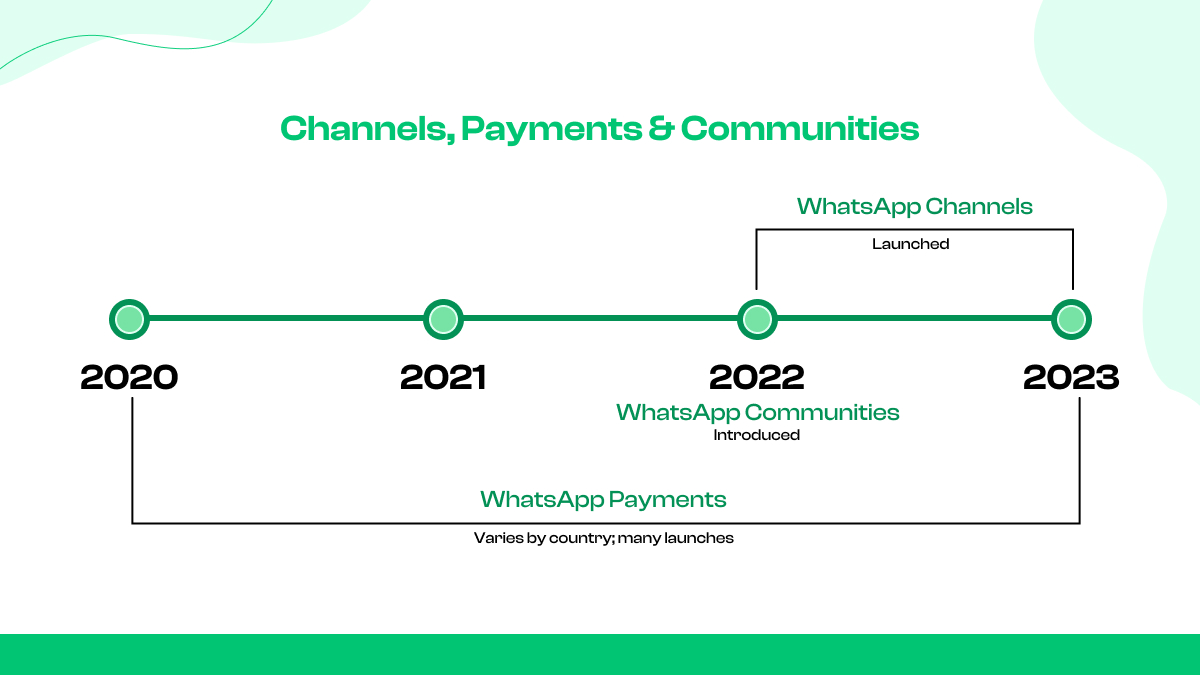
Additional Insights
Channels: WhatsApp channels are now being used increasingly for broadcast-style updates, such as news, official announcements, and creator content. WhatsApp recently crossed ~500 million users in Channels. And growing channels have now become even easier with Socialplug’s services.
Communities: This feature lets WhatsApp users organize group chats into structured sub-groups under umbrella topics. Millions of messages are sent daily in these Communities, with large bases of users in groups and sub-groups.
Payments: Adoption of the payments feature depends heavily on regulatory environment and integration. In markets that have a rather supportive regulatory environment, WhatsApp Pay or local payment integrations are more used. However, global numbers are not uniformly available.
WhatsApp vs Competitors
Having a look at how WhatsApp stands out among its competitors, as in other popular messaging apps, will help you understand the platform’s market power and where rivals are gaining ground.
For your understanding, we will compare global reach, rough engagement signals, and regional strengths between the apps below.
Comparative market position — quick takeaways
WhatsApp: It remains the global leader by a wide margin, boasting around 3 billion monthly active users (MAUs) in 2025. The platform dominates in many countries across Asia, Latin America, Africa and parts of Europe.
WeChat: While this platform has the second largest user base as a single-app messaging platform, its user base is mostly based in China. WeChat has around 1.3–1.4 billion MAUs, and most of them are predominantly from China, making the platform extremely sticky in its home market.
Telegram: Telegram is another growing platform, which is experiencing a rapid surge in its user base. In 2025, the platform has reached 1 billion MAUs. Features like channels, groups, and creator monetization are attracting more and more users, helping the platform grow quickly.
Facebook Messenger: The messenger app of Facebook has roughly around 1.0–1.1 billion MAUs, with a particularly strong presence in USA and parts of Europe.
Signal: Compared to others, it’s a much smaller platform. It’s mainly influential in privacy-focused niches and offers high privacy to its users, boasting a raw user base of 70–100 million.
Global comparison (monthly active users)
Market share by country & regional strengths
WhatsApp is the top messaging app in many countries and regions, such as across India, Brazil, much of Latin America, Africa, parts of Europe. The platform sometimes hold a 70–90%+ penetration in smartphone populations in these markets.
Meanwhile, WeChat dominates in China, where WhatsApp is essentially non-competitive.
Telegram has become popular for the opportunity it provides to create larger public channels and communities. It has particularly large user bases in Eurasia, parts of the Middle East, and increasingly in Western markets.
Messenger remains particularly strong in the USA, Canada and parts of Europe, where Facebook/Meta’s ecosystem is highly penetrated.
Engagement metrics vs. competitors
Message volume: Over a hundred billion messages are sent daily on WhatsApp, and such a massive volume is a clear signal of scale and engagement. WeChat and Telegram also report high activity, but on different usage criteria (commerce/miniprograms vs public channels).
Feature engagement: Telegram leads in channel/subscriber dynamics and public discovery; WeChat leads in in-app commerce and time-spent because of mini-programs; WhatsApp leads in private messaging volume and business messaging adoption.
Privacy positioning: Signal is the leader for privacy-conscious adoption, though its user base remains small compared with WhatsApp and Telegram.
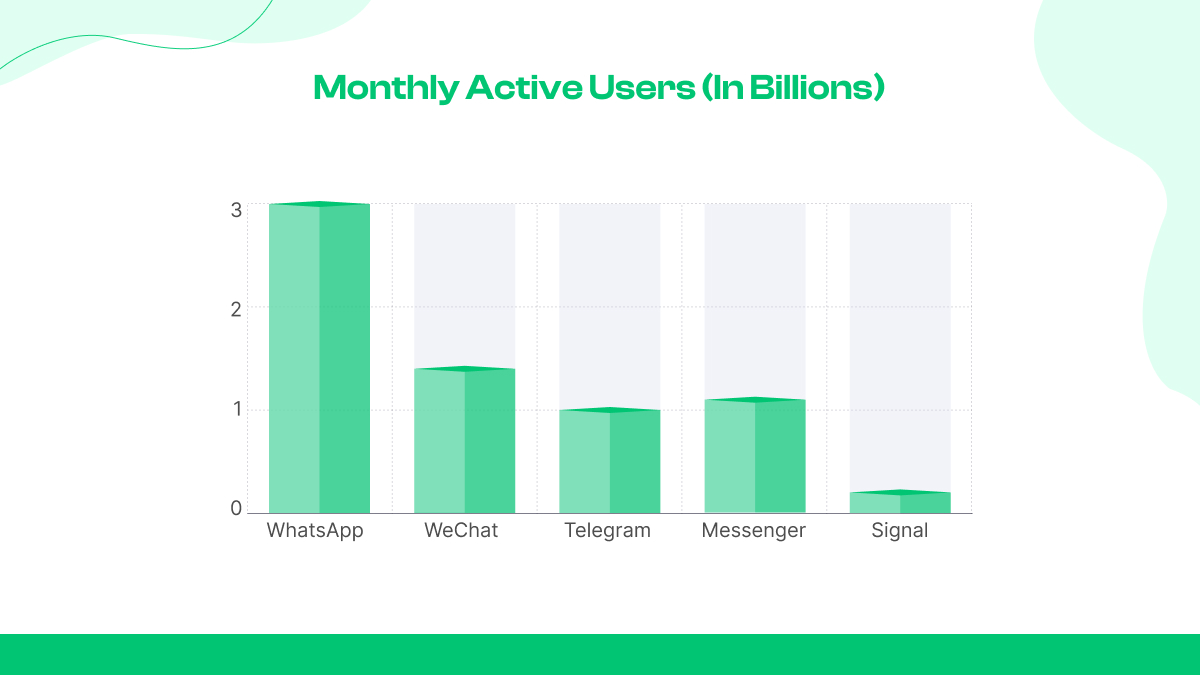
What this means for brands & developers
WhatsApp will be an unavoidable platform for you if your audience is global, and or particularly based in APAC, Latin America, Africa, and Europe.
You can go for Telegram, if you require public broadcasting, large communities, creator tools, or channels with discoverability.
If privacy is your primary and main focus, then Signal is a more credible platform for you, with its privacy-first messaging and enterprise security features.
However, if you want to focus on China, WeChat is the best option for you.
No matter whatever platform you decide to use, you can go for Socialplug’s services to build your presence on any platform.
Final Words
So, as years keep passing, the story of WhatsApp’s triumph as the leading messaging app continues. The steady growth experienced by the platform isn’t showing any signs of slowing down anytime soon, with more and more people joining its user base every day. And not just the texting, new features like Channels and Payments and expanding have made it integral in many people’s lives, be it for personal communication needs or for their business.
The platform’s focus on privacy, accessibility, and innovation keeps it ahead of competitors. Moreover, as Meta continues to integrate WhatsApp more into its ecosystem, WhatsApp’s influence will only grow stronger in the years to come.
With billions of daily interactions, the app remains central to how people and brands connect worldwide. Whether you’re a user, marketer, or business owner, understanding these trends can help you stay ahead in how people communicate in 2025 and beyond.
Frequently Asked Questions
What devices are most used to access WhatsApp?
Over 95% of users use their personal mobile phones to access WhatsApp, with Android users being 85% and iOS users being 15%. WhatsApp Web and Desktop account for under 5% of total usage.
How many users use WhatsApp Stickers or GIFs?
About 70% of WhatsApp users use stickers or GIFs weekly; animated sticker packs see particularly high engagement among users aged 18–34.
How many users actively delete messages or clear chat history?
An estimated 30–35% of users regularly delete messages or clear chats, especially in markets with limited storage or privacy awareness
How many messages are forwarded daily on WhatsApp?
Around 3–4 billion messages are forwarded per day, out of over 100 billion total messages sent daily.
How popular are WhatsApp group video calls?
Group video and voice calls account for nearly 20% of total call time on WhatsApp, with usage peaking during weekends and holidays.
Which type of business sees the highest engagement on WhatsApp?
E-commerce, customer service, and local retail sectors record the highest engagement — with response rates averaging 60–70% on WhatsApp Business.









.svg)
.svg)








0 Comments
Great tips! I never realized how much engagement impacts growth more than just posting frequently. I've been focusing only on content, but now I see how interacting with my audience can make a difference. Time to step up my strategy!
Super helpful article! I always thought Facebook Groups were just for discussions and never really considered them as a tool for growing followers. The idea of actively engaging and sharing valuable content in relevant groups makes so much sense. I'll definitely start participating more and see how it impacts my page. Thanks for the great advice!